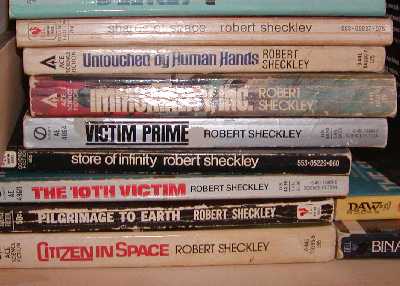The great satirical science fiction author Robert Sheckley passed away on December 9, 2005. He was 77.
 Before Douglas Adams and Terry Pratchett (and perhaps Connie Willis), there was Robert Sheckley. Far from a mere wiseacre (although he was that and much more), Sheckley was one of the first authors to fuse satire with science fiction. Years before Stephen King ripped off the idea for The Running Man and decades before the crazed spate of reality television shows, Sheckley had written a short story, “The Seventh Victim,” in 1953, devising a futuristic world in which game show contestants were designated Hunters and Victims and competed for cash by murdering contestants. A film and a novel followed: The Tenth Victim (1965). Here is an excerpt that shows Sheckley in top goofball form:
Before Douglas Adams and Terry Pratchett (and perhaps Connie Willis), there was Robert Sheckley. Far from a mere wiseacre (although he was that and much more), Sheckley was one of the first authors to fuse satire with science fiction. Years before Stephen King ripped off the idea for The Running Man and decades before the crazed spate of reality television shows, Sheckley had written a short story, “The Seventh Victim,” in 1953, devising a futuristic world in which game show contestants were designated Hunters and Victims and competed for cash by murdering contestants. A film and a novel followed: The Tenth Victim (1965). Here is an excerpt that shows Sheckley in top goofball form:
Long legs flashing, sable coat clutched beneath one arm, Caroline ran past the tawdry splendors of Lexington Avenue and fought her way through a crowd gathered to watch the public impalement of a litterbug on the great granite stake at 69th and Park. No one even reamrked on Caroline’s progress; their eyes were intent on the wretched criminal, a lout from Hoboken with a telltale Hershey paper crumpled at his feet and with chocolate smeared miserably on his hands. Stony-faced they listened to his specious excuses, his pathetic pleas; and they saw his face turn a mottled gray as two public executioners lifted him by the arms and legs and lifted him high in the air, positioned for the final plunge onto Malefactor’s Stake. There was a good deal of interest just then in the newly instituted policy of open-air executions (“What have we got to be ashamed of?”) and not much current interest in the predictably murderous antics of Hunters and Victims.
Note the specific details nestled within these lengthy sentences. We have here a ridiculously picayune offense attracting a mob, complete with the attention given to the “telltale Hershey paper crumpled at his feet.” Not only is this “criminal” being executed for a trivial offense, but this is no mere hanging, but a more atavistic “impalement.” There is an enduring rivalry between New Jersey vs. New York, as if the crowd completely expected some lout from Hoboken to sully their neighborhood. Further, murder, by way of being televised, has been marginalized and is now devoid of the appropriate horrific response.
When Sheckley came along in the 1950s, speculative fiction needed a swift kick in the ass. While early innovators such as Alfred Bester and Fritz Leiber were just beginning to expand the genre’s limits (all to come full circle in the so-called “Golden Age” of the 1960s) beyond alien empires, robots and humanity’s skirmishes with extraterrestrials, Sheckley had a decidedly more mischevious purpose.
Immortality, Inc. (1958) imagined a world in which science had proven that an afterlife existed, but corporations charged exorbitant fees to get there. Dimension of Miracles (1968) concerns a man who wins the lottery, but must return to Earth to get his prize. And getting to Earth, much less the right Earth in the right time, proves a greater struggle than expected.
But Sheckley was far from a mere funnyman. He wasn’t afraid to experiment. His novel, Options (1975), was composed of seventy-seven brief chapters, resulting in a Flann O’Brien style collection of phantasmagorical imagery which may or may not be real.
It’s really too bad that Sheckley spent much of his latter years writing novels for Deep Space Nine and Babylon 5 (sadly, among the few of his works still in print) and never received the full credit he deserved. His work will be truly missed. However, if you’d like to sample, Nesfa Press has issued The Masque of Mañana, which contains Sheckley’s major short stories. They’ve also published Dimensions of Sheckley, an omnibus collection that contains five of his novels.
Failing that, the Robert Sheckley website has preserved a television appearance which was recorded in Romania last year.
Bob Sheckley died a month ago. It still stings, so I was surfing for other fans who’ve written tributes to him. I loved your piece on Sheckley.
Interesting and puzzling about “The Running Man” as you mentioned. Sheckley told me he had called King awkwardly, to ask why Running Man was so close toSheck’s story, I believe, “The Prize of Peri”. Bob knew King had been a fan of his stories and Sheckley also liked King. Bob said King said he couldn’t remember if he ever read “Peril” and they had to leave it at that. He thought King felt bad and must’ve ripped him off by accident. It happens.
I knew Bob and was lucky enough to work with him on a number of scripts, a video game and one unfinished book we collaborated on. I’ll finish it. I wrote him a remembrance, and posted it at
http://nielsenhayden.com/makinglight/archives/007078.html
R.I.P. my friend. We miss you.